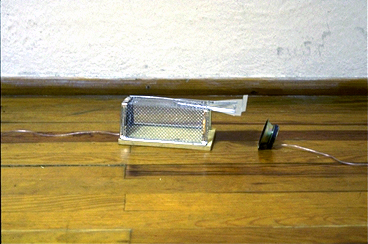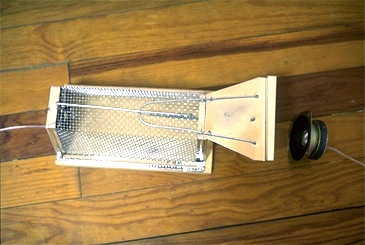 |
IMPASSE
 |
IMPASSE
In Zen Buddhism, participant monks pose existential questions to their master such as: ¿Which is the nature of the Buddha? [1]; the Koan represents an irrational answer that the master poses to his pupil and which drives him into an endless road.
"When a man has taken with all his strength a Koan, he ends by finding the limit of his mental tension and he arrives to a dead end. Suddenly, he finds that his spirit and body are blown up from the world at the same time that the Koan. This is called to free your prey. When the astonishment is abandoned and the breath comes back, he feels an unexpressive happiness"[2].
 _________
_________
Impasse. 1997.
Impasse constitutes an ordinary object; it is a rat trap (the trap closes its door when the rat takes the bait). The use of this trap has been modified in such a way that the bait for the rat is substituted by a small speaker that reproduces the sound of the trap when it closes down. This sound was stretched and filtered by a computer, obtaining in this way a long high and hypnotizing result. Out of the trap, like trying to get in, we find a bigger speaker that reproduces the sound of the shutting door, but this time only stretched a little bit, and creating then the impression of a slow motion movement.
Impasse is a kind of a trap for its self. Before an absurd question, we will always obtain an absurd answer. We will automatically be in an impasse situation [3]. On the other hand, the sound of the trap reminds us the stick with which the master Zen hits his pupil when he questions him in a stupid way. In Buddhism, the insistence and the repetition of this stroke could temporarily lead us to a state of Satori (or illumination). Our own trap could liberate us if the degree of tension in our mind is high enough so that the illusion of being trapped will vanish.

Impasse. Domestica exhibition. Mexico City, 1998.
[1] In our occidental culture, this question would be equivalent to asking about the cause and the origin of God.
[2] Fragment of a text of Hakuin cited by Susuki in: Essays in Zen Buddhism, Volume 3.
[3] Impasse means in French, dead end road.